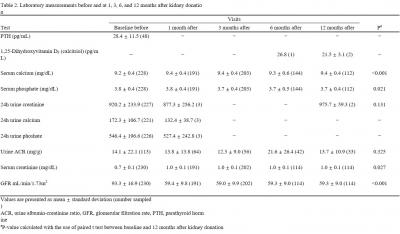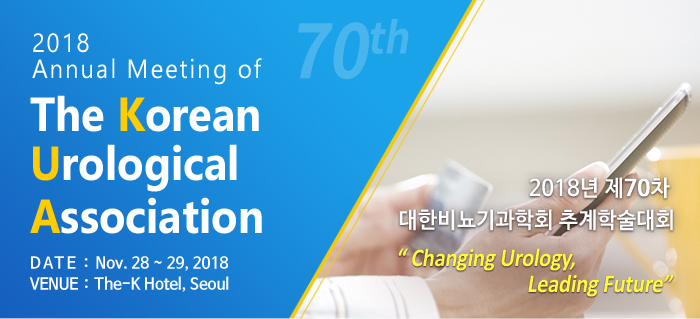|
Trauma & Others(구연)
|
International Session Ⅱ (I-003)
Crystal B (3F)
11월 29일(목) 15:00-16:00
|
|
|
폐경기 아시아 여성에 있어 생체 신공여자의 신 적출술 후 미네랄 대사의 변화에 대한 분석 |
| ¹연세대학교 의과대학 비뇨의학교실, 비뇨의과학연구소, ²Brain Korea 21 PLUS project for medical science, Yonsei university, ³국립건강보험공단 일산병원 비뇨의학과, ⁴한양대학교 의과대학 비뇨의학교실, 5연세대학교 의과대학 외과학교실-이식이과 |
| 박지수¹, 윤민지¹, 나준채¹, 이형호³, 윤영은⁴, 허규하5,김명수5, 김순일5, 김유선5, 나군호¹, 최영득¹, 홍성준¹², 한웅규¹² |
Purpose: Several studies have reported the occurrence of abnormalities of mineral and bone metabolism in living kidney donors after kidney transplantation. The incidence of osteoporosis increases with age and is associated with menopause. However, there have been no studies regarding short and long-term effects of kidney donations on mineral metabolism after kidney transplantation in postmenopausal Asian women.
Methods: We retrospectively analyzed living kidney donors in single institution. Among these subjects, postmenopausal women aged 50 years and older were selected for analysis. We excluded subjects who were receiving medication that is known to affect calcium metabolism such as antiresorptive agents.
Results: Among 230 living kidney donors, during the 1-year follow-up periods, the levels of serum calcium significantly increased (p<0.001), while the serum phosphate significantly decreased (p=0.021) compared to the baseline before the donor nephrectomy. GFR significantly decreased (p<0.001) to the almost half of the baseline values. 2 (0.8%) kidney donors had the event of fractures and 3 (1.3%) kidney donors had been diagnosed as cardiovascular disease after the kidney donation.
Conclusion: Similar to previous studies, kidney donations resulted in higher excretion of phosphate which alters serum markers of bone metabolism that could be associated with bone health in postmenopausal Asian women. Further long-term studies are required in order to assess the effect of kidney donations on mineral metabolism. |
  |
|
keywords : living donor nephrectomy, mineral metabolism, postmenopausal women |
|

